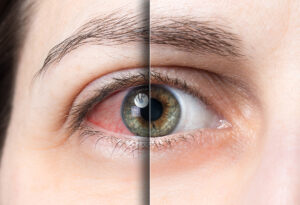
Dry eyes can be a torturous condition, made worse by innocent attempts like rubbing your eyes to relieve the terrible itchy, burning and gritty feeling. Some people are prone to dry eyes due to medical conditions or previous laser eye surgery. Still, plenty of lifestyle habits can contribute to the uncomfortable feeling and vision impairment caused by dry eyes. Women, people over 50 and contact lens wearers have an increased risk of dry eyes.
Our ophthalmologists can relieve your dry eyes and have these tips for adjusting your everyday life to reduce symptoms.
1. Hydration and a Nutritional Diet
A poor diet and dehydration could worsen your dry eye symptoms. Your eyes rely on tear quality and quantity to lubricate the eye’s surface for clear vision and healthy eyes. Dry eye disease may cause you to produce fewer tears or poor-quality tears, which leads to inflammation and can even damage your cornea.
Dehydration affects tear production, and a diet lacking omega-3 fatty acids and other eye-essential nutrients can contribute to the issue. Poor nutrition can lead to puffy eyelids, red eyes and dry eyes as well. An omega-3 supplement may help.
2. Regular Screen Breaks
Long days on the computer for work or school take a toll on your eyes. You blink less when you look at your computer, phone or tablet screen, which only causes more issues with dryness and eye irritation. Take regular breaks using the 20-20-20 rule of eye care — take a 20-second break every 20 minutes to look 20 feet away. Our doctors also recommend closing your eyes for a few minutes or repeatedly blinking to encourage even tear distribution. Positioning your computer below eye level is another tip, so your eyes do not have to open as wide to view the screen, slowing tear evaporation.
You can improve dry eye symptoms by avoiding air-conditioning vents, ceiling fans, room fans and other systems that move air.
3. Plenty of Rest
If you’ve ever pulled an all-nighter to finish your final paper or complete a work project, you know that your eyes pay the price for that lack of sleep. Bloodshot eyes, dark under-eye circles, twitching eyes, blurred vision and, of course, dry eyes are par for the course. Make sure you get plenty of sleep most nights to improve your dry eye symptoms such as eye fatigue, watery eyes and light sensitivity.
4. UV-Blocking Sunglasses
It’s easy to forget your sunglasses in your rush to leave the house in the morning, but UV-blocking eyewear is essential to preserving your vision and reducing dry eye symptoms. Our eye doctors recommend wrap-around sunglasses to shield your eyes from wind and dust and protect you from the sun’s harmful rays. In addition to easing dry eye, wearing sunglasses lowers your risk of developing cataracts and other eye diseases.
5. Smoking
Smoking is a bad habit for countless health reasons. Dry eyes worsen around smoke, and the act itself makes you four times more likely to lose your vision to eye diseases, including macular degeneration, cataracts and diabetic retinopathy. Rubbing your eyes to alleviate dry eye symptoms only contributes to the puffy eyelid appearance and burning feeling because the friction may cause tiny blood vessels to break under the skin’s surface. Regular eye rubbing may harm the cornea.
Dry Eye Treatment Options
Lubricating eye drops are often the first-line treatment for dry eye syndrome. At Mack Eye Center, we offer intense pulsed light (IPL) therapy, a non-surgical procedure that warms the tissues to improve or eliminate dry eyes. Protective sunglasses, prescription eye drops and other treatments are available to reduce the irritating effects of dry eyes.
Contact Mack Eye Center today to schedule your eye exam and discuss your dry eyes.

